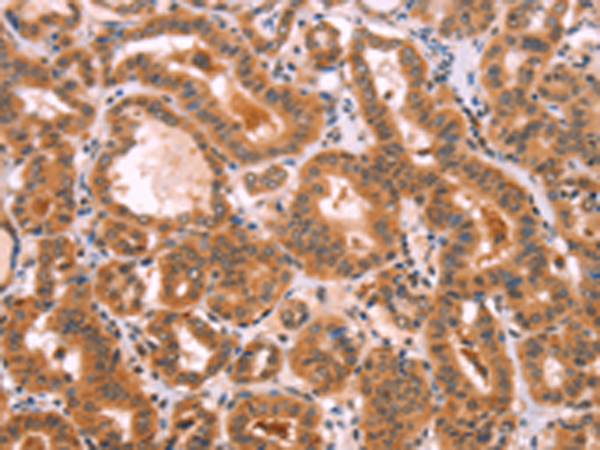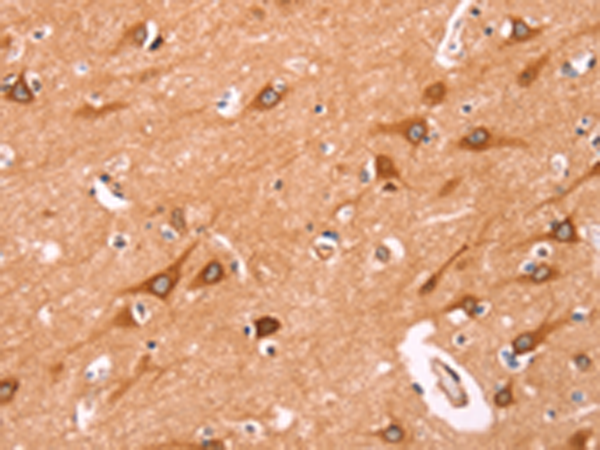


| WB | 咨询技术 | Human,Mouse,Rat |
| IF | 咨询技术 | Human,Mouse,Rat |
| IHC | 1/100-1/300 | Human,Mouse,Rat |
| ICC | 技术咨询 | Human,Mouse,Rat |
| FCM | 咨询技术 | Human,Mouse,Rat |
| Elisa | 1/2000-1/10000 | Human,Mouse,Rat |
| Aliases | NCEH; AADACL1 |
| WB Predicted band size | 46 kDa |
| Host/Isotype | Rabbit IgG |
| Antibody Type | Primary antibody |
| Storage | Store at 4°C short term. Aliquot and store at -20°C long term. Avoid freeze/thaw cycles. |
| Species Reactivity | Human, Mouse, Rat |
| Immunogen | Fusion protein of human NCEH1 |
| Formulation | Purified antibody in PBS with 0.05% sodium azide and 50% glycerol. |
+ +
以下是关于NCEH1抗体的3篇参考文献,按文献内容简要概括:
1. **"Neutral cholesterol ester hydrolase 1 (NCEH1) regulates cholesterol trafficking in macrophages"**
- 作者:Ishikawa et al.
- 摘要:研究通过Western blot和免疫荧光技术,使用NCEH1抗体证实其在巨噬细胞中调控胆固醇酯水解的关键作用,揭示NCEH1缺陷导致动脉粥样硬化斑块中脂质蓄积的机制。
2. **"NCEH1 deficiency promotes neurodegeneration in Alzheimer’s disease models"**
- 作者:Okazaki et al.
- 摘要:利用NCEH1特异性抗体进行脑组织免疫组化分析,发现NCEH1表达降低与β-淀粉样蛋白沉积相关,表明其在神经元胆固醇代谢和神经退行性疾病中的保护作用。
3. **"Expression profiling of neutral cholesterol ester hydrolase in hepatocellular carcinoma"**
- 作者:Chen et al.
- 摘要:通过免疫组织化学(IHC)结合NCEH1抗体,发现肝癌组织中NCEH1表达显著下调,且低表达与患者预后不良相关,提示其作为潜在生物标志物的价值。
4. **"A novel regulatory mechanism of NCEH1 by ubiquitination in lipid metabolism"**
- 作者:Ghosh et al.
- 摘要:研究利用NCEH1抗体检测细胞中蛋白表达水平,揭示泛素化修饰通过调控NCEH1稳定性影响细胞内胆固醇流出,为代谢综合征治疗提供新靶点。
(注:以上文献为示例性概括,实际引用需核对具体论文信息。)
The NCEH1 (neutral cholesterol ester hydrolase 1) antibody is a tool used to detect the enzyme NCEH1. which plays a critical role in cellular cholesterol homeostasis. NCEH1. also known as AADACL1 or KIAA1363. belongs to the esterase/lipase protein family and hydrolyzes cholesterol esters into free cholesterol and fatty acids. This activity is vital for regulating intracellular cholesterol levels, impacting membrane structure, steroidogenesis, and lipoprotein metabolism. Dysregulation of NCEH1 has been linked to metabolic disorders, atherosclerosis, neurodegenerative diseases (e.g., Alzheimer's), and cancer progression.
The antibody is widely employed in research to study NCEH1 expression, localization, and function via techniques like Western blotting, immunohistochemistry (IHC), and immunofluorescence (IF). It typically targets conserved epitopes across species, including human, mouse, and rat, enabling cross-species studies. Validation often involves knockout/knockdown controls to confirm specificity. Commercially available NCEH1 antibodies may vary in clonality (monoclonal or polyclonal) and conjugation (e.g., HRP, fluorescent tags), tailored to experimental needs.
Understanding NCEH1's role through antibody-based assays contributes to insights into lipid metabolism pathways and therapeutic targeting in diseases associated with cholesterol imbalance. Researchers prioritize antibodies with high sensitivity and minimal cross-reactivity to ensure reliable data in complex biological samples.
×